Postdoc
Texas Center for Superconductivity (TcSUH) - 2011
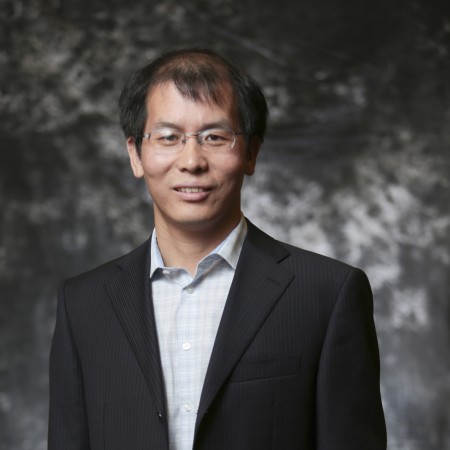
Professional Preparation
PhD
University of Houston - 2009
University of Houston - 2009
BS
University of Science &Technology of China (USTC) - 2004
University of Science &Technology of China (USTC) - 2004
Research Areas
Our group works on experimental quantum materials physics and electronic materials development. Several correlated thrusts drive our research: 1) Crystal growth, development, and discovery of new quantum materials, especially for new superconductors, topological materials, and 2D materials; 2)Explore, Detect, and Control of Novel Quantum States down to the nanoscopic level of quantized energy excitations, including spin interaction, charge correlation, orbital symmetry, and lattice instability; 3)Develop new van der Waals materials down to 2D limits and their heterostructures aiming for new & enhanced electrical, magnetic, thermal, ferroelectric and multiferroic performances; 4)New CMOS-compatible WBG materials and new thermal materials aiming for heterogeneous integration of semiconductors for enhanced electronic and thermal performances. Our group is equipped with (1) advanced techniques and comprehensive facilities aiming to synthesize the highest possible quality of polycrystalline and bulk single crystals of quantum and semiconducting materials, (2) various tools to deposit, transfer, and fabricate small-scale devices; and (3) a wide spectrum of tools for experimental studies of structural, electrical transport, magnetic, and thermal properties as functions of chemical composition, temperature, magnetic field, pressure and electrical voltage; 4)various exfoliation, transfer and deposition tools to grow high-quality thin films and build various device heterostructures for quantum and semiconductor research. Our current research interests are in superconducting, topological, ultrahigh & ultralow thermal conducting, two-dimensional vdW materials (metals, semiconductors & magnets), and new WBG semiconductors. At the same time, we also have a broad interest in other energy-related thermoelectric, magnetic, multiferroic, and electronic materials, and complex multi-interaction systems, especially quantum materials with strong light-spin/charge/orbital interactions, quantum light sources, quantum computing, quantum criticality, and quantum spin liquid. We often design and discover new materials along the process with unexpected physical phenomena and properties. We welcome highly motivated graduate and undergraduate students to join the wonderful research journey with us!Publications
Canted antiferromagnetism and spin reorientation in corner-shared single chain quasi-one-dimensional Ba2FeSe3 2026 - Journal Article
Magnetic Kagome Lattice (Gd,Tb,Dy,Ho,Er)Mn
6
Sn
6
with High Configuration Entropy 2026 - Journal Article
Vapor‐Flux Growth of c‐BP Single Crystals With Concurrently High Electrical Resistivity and Isotope‐Enhanced High Thermal Conductivity 2026 - Journal Article
Emergent ferromagnetism and unusual irreversible magnetoresistance in an intercalated van der Waals antiferromagnet 2026 - Journal Article
High-yield growth of high-quality cubic BAs single crystals using the Bridgman method 2025 - Journal Article
Colossal Terahertz Emission with Ultrafast Tunability Based on Van der Waals Ferroelectric NbOI2 2025 - Journal Article
Tuning the Magnetic Properties of CrI3 Using Ni Thin Film Deposition for Applications in Spintronic Devices 2025 - Journal Article
Awards
NSM Outstanding Teaching Award for Tenured Professor - UTD, School of NSM [2024]
President’s Teaching Excellence Award in Undergraduate Instruction - University of Texas at Dallas [2023]
NSM Outstanding Teaching Award for Tenure-track Professor - UTD, School of NSM [2019]
Appointments
Professor
University of Texas at Dallas [2025–Present]
University of Texas at Dallas [2025–Present]
Associate Professor
University of Texas at Dallas [2021–2025]
University of Texas at Dallas [2021–2025]
Assistant Professor
University of Texas at Dallas [2015–2021]
University of Texas at Dallas [2015–2021]
Research Assistant Professor
Texas Center for Superconductivity(TcSUH) and University of Houston [2012–2015]
Texas Center for Superconductivity(TcSUH) and University of Houston [2012–2015]
News Articles
Heat-Conducting Crystals Could Help Computer Chips Keep Their Cool
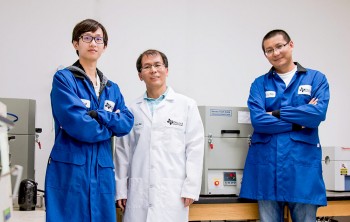 If your laptop or cellphone starts to feel warm after playing hours of video games or running too many apps at one time, those devices are actually doing their job.
If your laptop or cellphone starts to feel warm after playing hours of video games or running too many apps at one time, those devices are actually doing their job.Whisking heat away from the circuitry in a computer’s innards to the outside environment is critical: Overheated computer chips can make programs run slower or freeze, shut the device down altogether or cause permanent damage.
Crystals Reveal New Physics of Topological Insulators
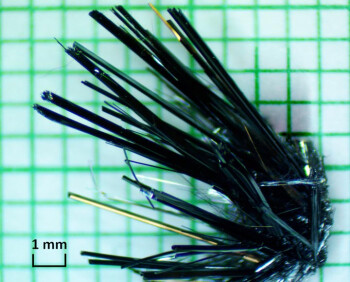 Combining exceptional crystal-growing skills with theoretical predictions, University of Texas at Dallas scientists and their collaborators have revealed new insights into materials called topological insulators.
Combining exceptional crystal-growing skills with theoretical predictions, University of Texas at Dallas scientists and their collaborators have revealed new insights into materials called topological insulators.Physicists found that crystals made from bismuth and iodine transition into a novel structure at room temperature that significantly alters the material’s electronic properties.
Physicists’ 2D Crystals Show Promise for Advanced Electronics
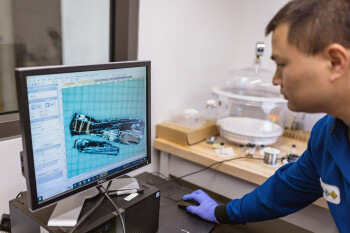 A team of researchers, led by University of Texas at Dallas scientists, has developed a new technique to grow exceptionally large, high-quality crystals that could help make advanced electronics, such as spintronic and magnetic optoelectronic devices, a reality.
A team of researchers, led by University of Texas at Dallas scientists, has developed a new technique to grow exceptionally large, high-quality crystals that could help make advanced electronics, such as spintronic and magnetic optoelectronic devices, a reality.Very thin layers — just one or two atoms thick — can be exfoliated easily from the bulk crystals. These two-dimensional layers exhibit surprising magnetic properties and are very stable in air at room temperature, making them of interest for use in devices that incorporate stacked layers of different materials.
Innovative Educators Earn President’s Teaching Excellence Awards
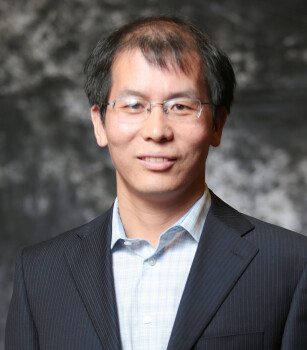 The University of Texas at Dallas recognized a group of faculty members for their outstanding achievements recently during the Center for Teaching and Learning’s sixth annual Celebration of Teaching Excellence.
The University of Texas at Dallas recognized a group of faculty members for their outstanding achievements recently during the Center for Teaching and Learning’s sixth annual Celebration of Teaching Excellence.Five educators received President’s Teaching Excellence Awards for their positive impact and innovative approaches in the classroom, while 21 others were honored for completing a national teaching course offered by the Association of College and University Educators (ACUE). Recent recipients of UTD’s mentoring awards and UT System honors were also among those recognized.